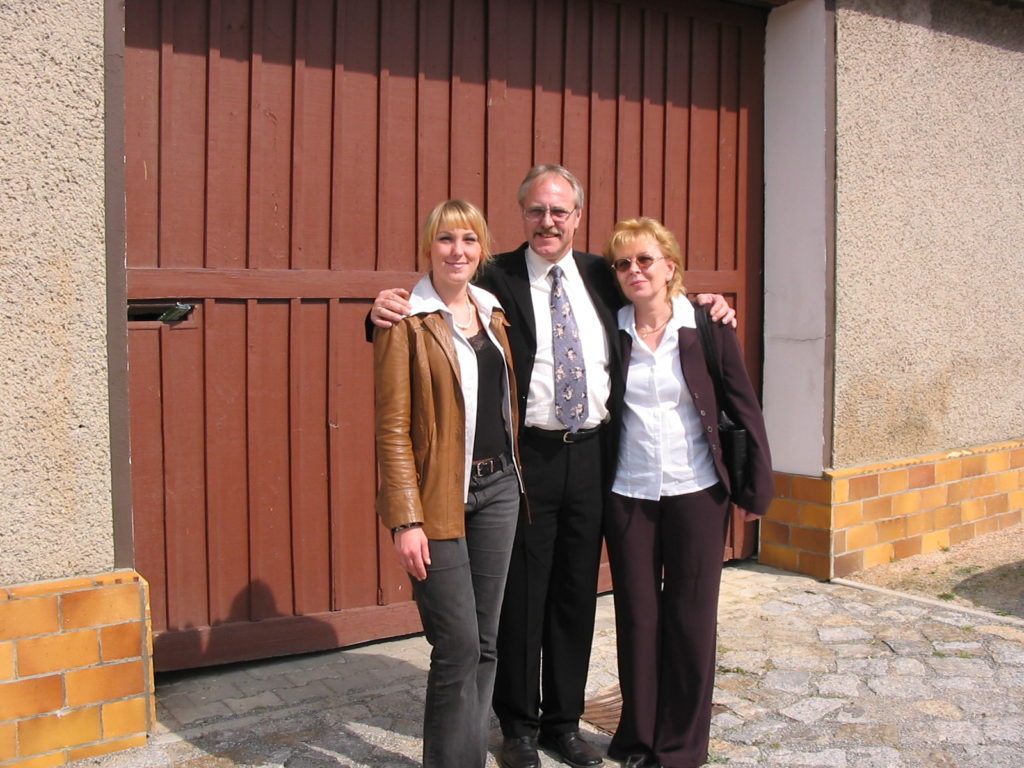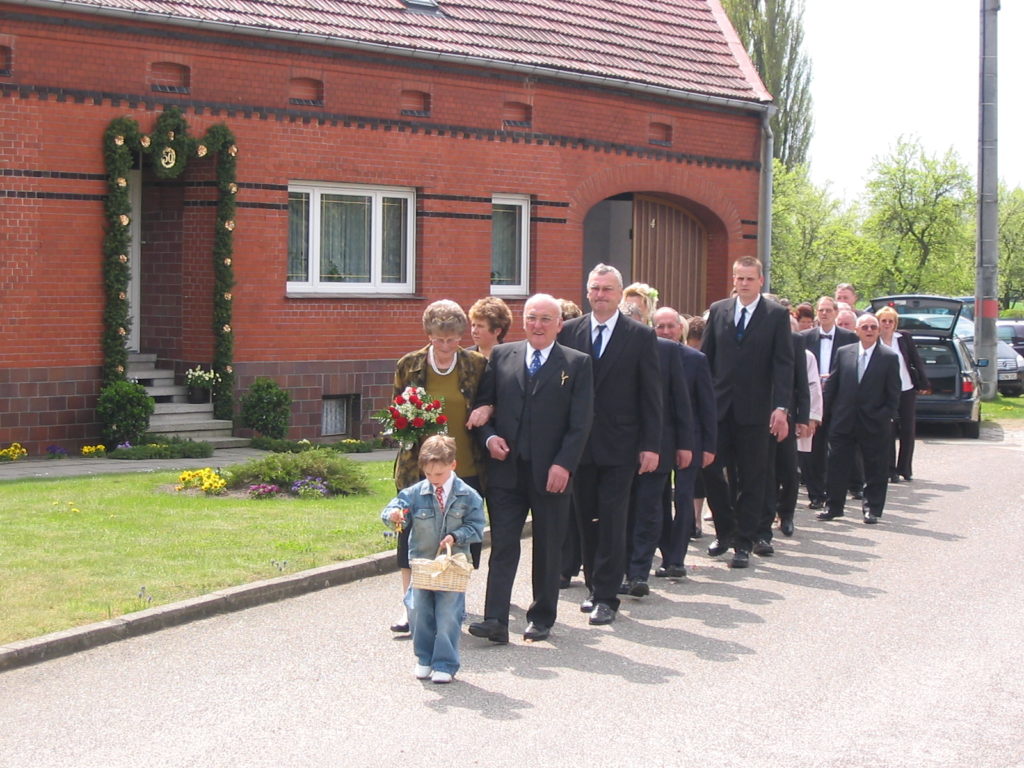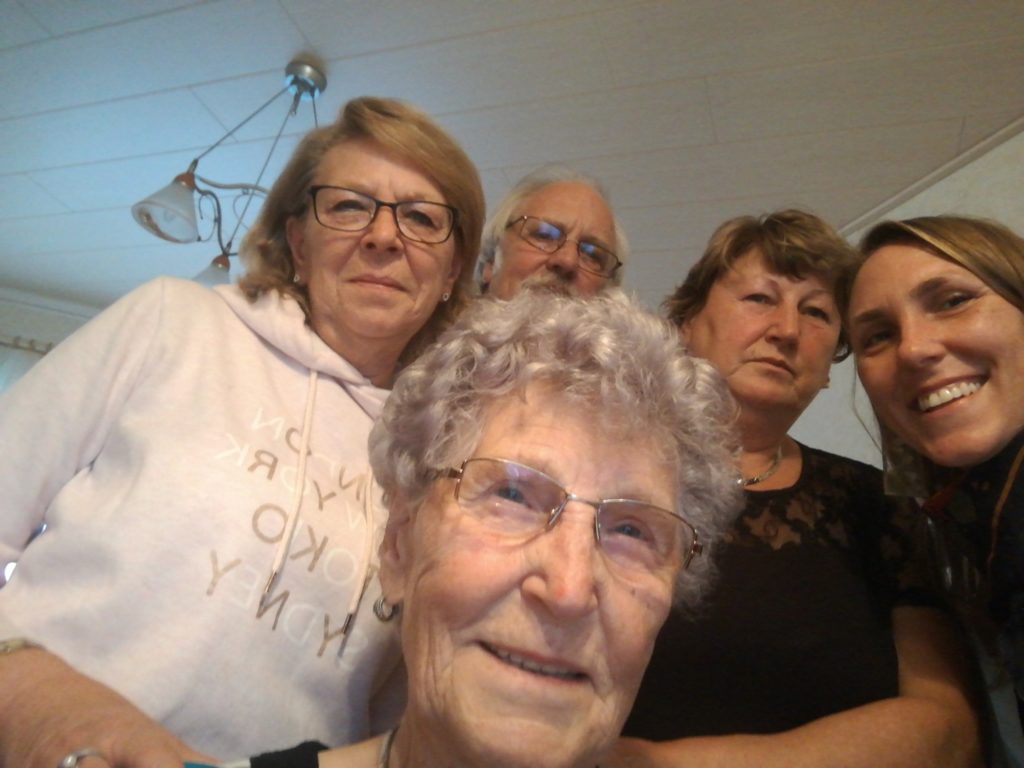Die anderen Leben [The Other Lives] is a book that deals with dialogues between two generations of East Germans about their family histories in form of ten essays. The title provokes distance, but it is also intriguing [1]. I wonder ‘Who are these Others?’ The subtitle ‘Generationengespräche OST’ [Generational Conversations EAST] seems to provide a first answer and sets up my position as a West German reader: ‘The Others’ refer not to me but to the East Germans. This separation between myself and them, however, diminishes while I read through the pages. My initial attitude of ‘What does this topic have to do with me?’ crumbles as I fly through the book, and I realise that it offers an invitation to recognise myself and question my own, that is, a West German background. With that, the authors Sabine Michel and Dörte Grimm have written an intimate and thought-provoking work that reaches beyond the usual East-West dichotomies. The success of their approach seems to prove them right. Published in 2020 with be.bra verlag, the book attracted a strong media response nationwide and has already gone into the second edition. In Germany, both authors are also known as film directors and their book shows the same enticing cinematic approach to story-telling and intimate reflection that is a testimony of a changing German society and contributes to a whole new set of questions about the recent past [2]. Supported by poetic black and white images made by photographer Ute Mahler [3], the effective documentation style makes the ten essays approachable. Instead of using an interview-style, the authors rather appear as compassionate listeners.
In the introduction, I learn about the motivation for this book project. ‘Since the Fall of the Wall and the reunification, people with East German biographies are faced with the challenges of a pan-German present […]’ [4]. With the increasing presence of West German structures after 1990, a discussion of East German lives and experiences rarely occurred, and that is not only a societal phenomenon. The absence of a personal ‘confrontation and the transgenerational speechlessness’ [5] begins in families. For both authors, this is first-hand experience. Sabine Michel, born in Dresden in 1971, grew up in a family that upheld antifascist and internationalist ideals. Her parents, both teachers, brought her up in line with socialist ideology. A conversation with them about ‘the real day-to-day-life’ in the GDR is still very difficult. Dörte Grimm, born in Brandenburg in 1978, experienced alongside her mother the decline and dismantling of a big textile company in Wittstock, Brandenburg, in the 1990s. Like so many others, Grimm’s mother lost her job after German reunification. Her experiences encouraged Grimm to co-found the ‘Perspektive hoch drei’, an initiative of young East Germans born between 1975 and 1985, the so-called Third Generation. The group, concerned about the public media discourse about East Germany that was led almost exclusively by West Germans, got together in 2010. They focus on the experiences and knowledge of their own generation and promote narratives that include both parts of the country – a matter that is more relevant than ever.
One of the key issues that the authors deal with concerns the question of why former GDR citizens feel personally offended when their former home country is being criticised, and what this does to the next generation who dares to question their parents’ lives. The authors use the term ‘Gefühlsstau’ [accumulation of feelings] to describe the unease and sense of guilt when confronting family members with their own past. The ones who seek the conversation, the children, are often accused of being ungrateful, while their parents either sink into silence or fall into modes of self-defence. And yes, the often collectively assigned Stasi-past may haunt many East Germans when being questioned about their past lives, but it falls way too short as an explanation for the continuing silence across generations.
The book vividly illustrates this phenomenon by means of ten ‘case studies’, i.e. dialogues between former ‘Wendekindern’ [children of German reunification] or then-young adults, and their parents. What at first glance could resemble the table of contents in a guidebook for parent-child relationships, reveals the personal and intimate style that characterises the book. Chapter headings such as ‘Ich wollte, dass du ein glückliches Kind bist’ [I wanted you to be a happy child] or ‘Dass sie einfach mal sagt, das hast du aber gut gemacht’ [That she simply says, you have done that well] give first insights into often unspoken hopes and unfulfilled wishes of both children and their parents. In many cases, these hopes and wishes have been constant and widely traveled companions that Michel and Grimm find in cities like Dresden and Berlin, but also in small villages in East and West Germany where the reader meets families from diverse professional environments and political and social classes.
Offering a panorama of various social milieus and private circumstances, the authors highlight that it is still not a complete and comprehensive picture. Despite this being an important project that navigates East German history, I feel invited to fill in the gaps with my own biography to add to a pan-German narrative. As they say, ‘Dies ist ein Buch, dem jeder sich selbst hinzufügt. Beim Lesen schon beginnt die Selbstbefragung’ [This is a book, to which everybody adds themselves. While reading it, self-questioning starts]. This introductory quote by Christa Wolf can be understood as an offer for self-reflection. In order to look ahead, we need to understand our past first. And because a conversation with others becomes only possible when we confront ourselves with ourselves. This is what the book project does: While of course these talks happen between generations on the background of the political and social turmoil of East Germany, the Fall of the Wall and subsequent years, the book more generally stimulates dialogues between families who have never really spoken about their past. It prompts the reader to recognise and to question oneself in one way or the other. The authors invite us to take our seat next to them in the living rooms and around the kitchen tables across Germany and to listen to the intimate dialogues between parents and their children and also invite us to witness the contemplative soliloquies and silent pauses, waiting to be filled with our own thoughts. These stories are at once private, East German biographies, and yet they should be recognised to contribute to the narrative of an entire nation. In many of them, I can see myself. Born in 1983, I grew up in a small Swabian city near Stuttgart with a West German father and a mother descending from a large family with ten siblings that live dispersed all over Germany. Part of my mother’s family story matches many facets of the biographies in the book. Hers is a story of German settlers in Russia of wars and displacements and of a new beginning as farmers in Brandenburg before the Wall was built. Then there was the decision to flee to the other side. My mother was born in a reception camp near Stuttgart in the 1950s, while many of her siblings stayed in the East. I have never really asked them about their reasons for staying or leaving. Partly, because I was, for a long time, simply not interested in my family history. I knew that I had relatives in the GDR, but to me they were merely names and faces from old photographs. This did not even change when I met them for the first time shortly after the Fall of the Wall. And it did not change instantly when I moved closer to study in Berlin in my early twenties. During our rare encounters, I felt that there was a connection between us but at the same time it was like meeting strangers whose experiences were worlds apart from mine.

Luckily, the feelings of unease have gradually disappeared. But the difficulty to ask about their past remains. Reading the stories in the book, this phenomenon appears to be symptomatic for a generation that somehow still floats in-between two Germanys, when it was normal to identify as either East or West German. With the ‘protagonists’ in the book, I learn that the difficulty to ask about the past often results from the fear of having to question one’s own positive memories and identity, as it is the case of a young woman in the book whose parents both worked for the Stasi (chapter: ‘You learn not to dig further’ [Du lernst, nicht weiter nachzubohren]). I also learn that sometimes children stop asking questions because they are afraid to hurt their parents, and I hear from parents who try to justify and defend themselves, who choose to remember selectively and consciously forget.
Often, Die anderen Leben reveals grief on both sides about what has been lost. However, this happens mostly without reproducing the cliché of the ‘Jammer-Ossie’ [6]. Rather, the book speaks of disappointment and disillusion after the Fall of the Wall, and about the feeling of being left behind and forced into a new system without having a place in it. There is the story of a mother, who lost her job after reunification and who could never really settle. Her involuntary role as a systemic victim finally becomes like a second skin for her that justifies and now protects her from failure (chapter: ‘I still had a few more men’ [Ich hatte dann noch einige Männer]). This sensation of becoming worthless manifests itself often in frustration and anger and/or is passed on to the children. There is a father and former Stasi agent, who worries about the current political developments in Germany: ‘That is why there is Pegida [7]. They are not Nazis, but old sods like me who went through the ‘Wende’ and who criticise the politics in this country and feel excluded from the West’ [8]. His feeling of being tolerated only as long as he does not ‘complain’ is shared by both parents and children in several chapters of the book. Some of the statements seem to confirm prevailing stereotypes of a more pronounced right-wing tendency in the East, like the one from a woman who finds that foreigners take away jobs (chapter: ‘I still had a few more men’ [Ich hatte dann noch einige Männer]) or the xenophobic remarks of a mother and her two sons about refugees (chapter: ‘I don’t feel like a Nazi’ [Ich fühle mich nicht wie ein Nazi]). Here, the struggle of the authors to remain calm comes to the fore, and I too find it hard to have sympathy with people who utter crude allegations and hostilities, while seeing that their structures, beliefs and values collapsed together with the GDR. However, by no means does it feel that the book tries to justify or to gloss over right-wing mentalities. It rather encourages us to reflect and to question our own stereotypes and beliefs. In one encounter, Michel describes her own expectations about a ‘Stasi-father’, ‘who will certainly show up on time for the conversation with his daughter’ [9]. The big oval table in the middle of the living room where daughter and father are sitting across from each other reminds her of the Stasi headquarters. At the same time, however, the father appears to Michel like an innocuous German pensioner who wears all-purpose clothes adaptable to all conditions.

These different vantage points facilitate recognition of emotions, fears, and problems that address Germany as a whole, such as the fast pace of postmodern societies, restlessness and societal pressures, the feeling of not being able to keep up, of isolation and instability. For many former GDR citizens who we meet in the book, community get-togethers and activities were an anchor that is irretrievably lost – but isn’t this feeling shared by many West Germans? ‘Are all the achievements of liberty and the free market economy worth it that people don’t come together anymore […] and that everyone stays for themselves in their little cell?’ [10]. The book certainly does not provide quick answers to these questions. Its value presents in the fact that these questions are being articulated, and they address everyone. By seeking the dialogue, the authors suggest overcoming divides and to build bridges between the experiences of East and West Germans. Such dialogues start on a small scale, within the microcosm of the family. The reader perceives the relief that many children feel, who have been finally able to ask questions they have avoided for a long time, and of parents who finally dare to talk. For many, the Fall of the Wall was not a liberation from the perceived evil of socialism, but after all this time it seems liberating to speak about the past with the closest family members.
The discussion does not end with the last chapter, nor does it solely focus on the past. The authors’ dedication clearly aims into the future: ‘To our children who will ask questions’ [Unseren Kindern, die uns Fragen stellen werden]. Hopefully, Die anderen Leben serves as an inspiration for further dialogues and contributes to the exchange between generations in East and West. And that it finally helps any Others to become a part of our lives and our lives to be part of theirs.

Notes
[1] All English translations of quotes, book, and film titles are the translations of the author. [2] Examples are the documentaries Zonenmädchen [Girls from the GDR] (2013) and Montags in Dresden [Mondays in Dresden] (2017) by Sabine Michel, and Dörte Grimm’s documentary Die Unberatenen. Ein Wendekinderporträt [The Unadvised. A Portrait of the Children of German Reunification] (2015). [3] Ute Mahler, born in 1949 in Berka (Thuringia), has been a professor at the University of Applied Sciences in Hamburg since 2000. She is a founding member of OSTKREUZ – an international photo production agency in Berlin – and lives in Hamburg and Lehnitz. Mahler’s photographs in this book project originate from her illustrated book Zusammenleben [Living Together]. Both publications share close insight into the many-faceted lives of people during and after the GDR. [4] Original quote (p. 11): ‚Seit dem Mauerfall und der Wiedervereinigung stehen Menschen mit ostdeutschen Biografien vor den Herausforderungen Weiner gesamtdeutschen Gegenwart […]‘. [5] Original quote (p. 13): ‚[…] Auseinandersetzung mit der generationsübergreifenden andauernden Sprachlosigkeit in Ostdeutschland‘. [6] ‚Wailing Ossi‘. This term is pejoratively used by the West for former GDR citizens and for people from East Germany today, to insinuate a predisposition to be ungrateful and unsatisfied with the new pan-German reality after 1990. Its equivalence on the other side is the East German stereotype of the ‘Besser-Wessi’ [the know-it-all West German] due to its attributed arrogance and constant patronising interference. [7] ‚Pegida‘ is the abbreviation of ‘Patriotic Europeans Against the Islamisation of the Occident’ [Patriotische Europäer gegen die Islamisierung des Abendlandes], a nationalist, anti-Islam and anti-immigration movement on the far right that came together for the first time in Dresden in 2014. Since then, Pegida has held many demonstrations across Germany and has also formed offshoots in various European countries. [8] Original quote (p. 30): ‚Die heutige politische Situation bereitet mir große Sorgen. Wie sich die Welt politisch entwickelt und wie die Menschen nichts tun. Deswegen gibt es Pegida. Das sind keine Nazis, sondern so alte Säcke wie ich, die die Wende durchgemacht haben und die Politik in diesem Land sehr kritisch sehen und die ausgegrenzt werden von diesen Wessis‘. [9] Original quote (p. 25): ‚Annetts Vater wird morgen aus einer Stadt im Osten anreisen und, sicher pünktlich um zehn Uhr, an ihrer Tür klingeln‘. [10] Original quote (p. 52): ‚Sind all die Errungenschaften der Freiheit in erster Linie und des Marktes in zweiter so viel wert, wenn die Menschen nicht mehr zusammenkommen, sich nicht mehr direkt austauschen, jeder fuer sich in seiner kleinen Zelle vor sich hin werkelt?‘.